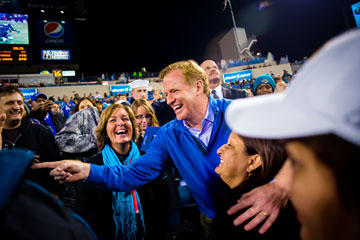
Goodell mingles with fans in Jacksonville, Fla. The Senator's son has a politician's touch
(6 of 9)
Goodell attended Washington & Jefferson College, outside Pittsburgh, and wised up. "I had my time," Goodell says, when asked why he got more serious about school. A bad knee had already ended his football days. "I did my thing in high school. I knew I had to prove that it wasn't anything more than I didn't focus." His freshman year, Goodell buried himself in the library. "Talk about a bore," he says. "Holy s---. I must tell you, it was miserable, it was difficult, because I put a lot of pressure on myself to succeed." Goodell got A's that first semester and graduated with honors.
Going the Distance
When Goodell started mapping out his career, he sent a letter to every NFL team. No one bit. The league office, however, hired him as an administrative intern in 1982. "When he first started, you could put him in any situation and feel confident you could trust him," says Joe Browne, the NFL's longtime communications guru. Carmen Policy, the former president of the San Francisco 49ers, remembers first meeting Goodell at the 1985 Super Bowl, at Stanford Stadium. "He was energetic and effective in a non-pushy way," says Policy. "You felt comfortable with him."
At the following year's Super Bowl, in New Orleans, Goodell volunteered to serve as legendary commissioner Pete Rozelle's driver. By then, he was already more established; this task seemed more fit for a college intern. "I'd do anything," says Goodell. "I wanted any opportunity that would keep me around." Circulating in Rozelle's orbit proved valuable. "I practically lived with him," says Goodell. "And he could see how I managed people, managed situations. I wouldn't give that back for a moment."
As he rose through the NFL ranks, Goodell got a handle on all sides of the NFL business, including stadium development, expansion, television negotiations and licensing. He also learned how to carry out change in a league that is essentially a monopoly run by wealthy, headstrong team owners. The NFL had prospered by sharing TV and national merchandising and sponsorship revenues equally, but in the 1990s, Dallas Cowboys owner Jerry Jones was at war with the league. He thought teams, rather than the NFL, should have rights to market their brands locally and pocket that revenue. This, Jones thought, would prod individual clubs to aggressively promote their brand--and in aggregate allow the NFL to attract more-lucrative national deals. Goodell helped convince the other owners that Jones was right. "From this office," Goodell says, "we can't promote 32 teams the way they can in their markets." Jones' model won out and has contributed to the league's success.
That business sense helped Goodell develop a strong rapport with the owners, who are in charge of hiring commissioners. But it by no means blunted his hard edge. "I told the other owners when he was made commissioner that I've seen him bite," says Jones. "He's easy in his demeanor. But I've been bitten." A few weeks into his tenure, Goodell handed down his first fine: $25,000 to Steelers chairman Dan Rooney for criticizing the refs. Rooney, a gracious man who is now ambassador to Ireland, had earlier delighted in telling Goodell the news of his appointment as commissioner. "The tender moment didn't last long," Goodell quips.
League Under Fire
